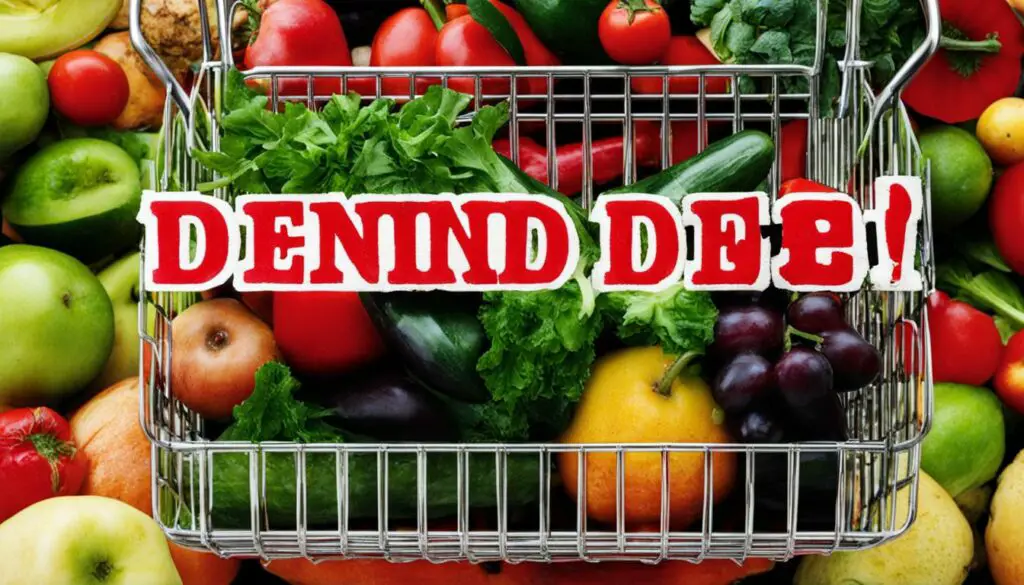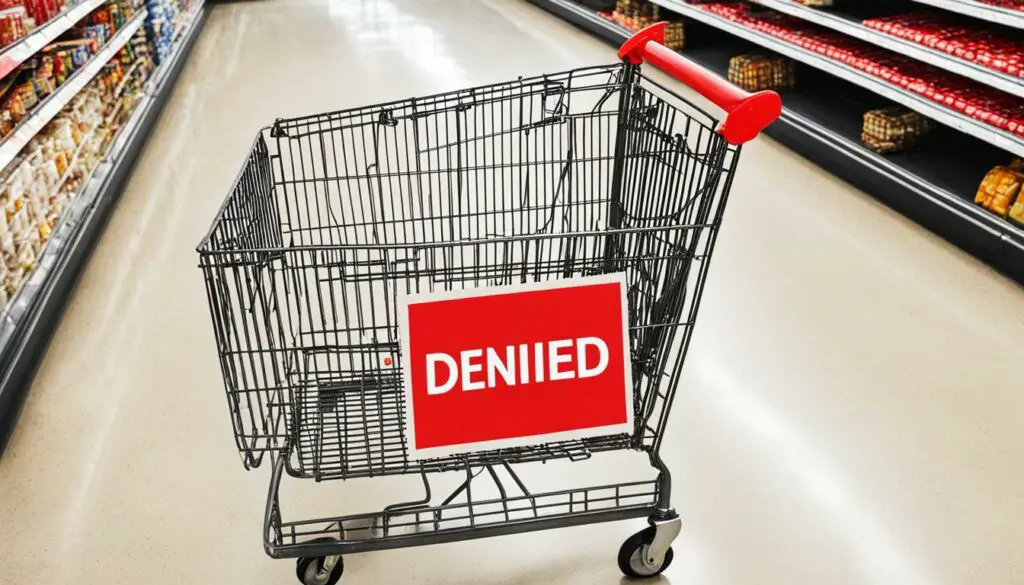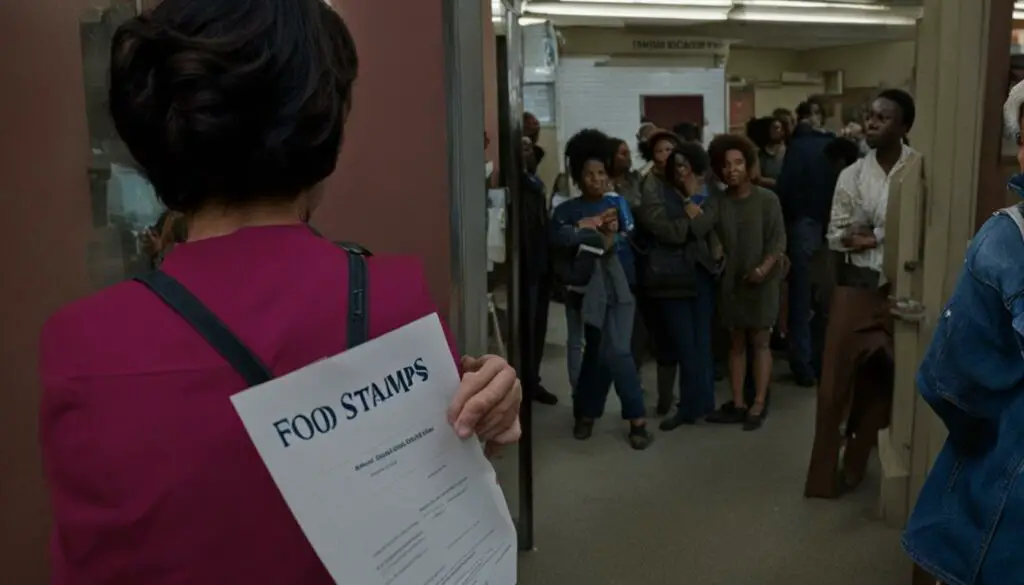Originally posted on December 25, 2023 @ 6:29 am
Have you recently been denied food stamps and are wondering why? It’s important to understand the common reasons for denial so that you can take the next steps in the appeals process or reapply with the correct documentation. In this article, we will explore the various factors that can contribute to a food stamps denial and provide insights to help you navigate the process.
Table of Contents
Key Takeaways:
- Familiarize yourself with the common reasons for food stamps denial to better understand why your application may have been denied.
- Work rules, income level, and documentation issues are among the main factors that can lead to a denial.
- If your application has been denied, you have the right to appeal the decision and present additional information to support your eligibility.
- Consider reaching out to local organizations and social service agencies for assistance and support in navigating the food stamps application process.
- Understanding the application process and providing all required information can increase your chances of approval.
Common Reasons for Food Stamps Denial

According to the sources, there are several common reasons for food stamps denial. These include:
- Failing to meet the work rules
- Not providing required documentation or verification
- Having an income level above the eligibility threshold
- Being determined ineligible due to other factors
It’s important to carefully review your application and ensure that you meet all the eligibility requirements to avoid a denial.
| Reasons for Denial | Description |
|---|---|
| Failing to meet the work rules | Not fulfilling the work-related requirements set by your state’s food stamps program. |
| Not providing required documentation or verification | Failing to submit documents or verifications necessary to prove your eligibility. |
| Having an income level above the eligibility threshold | Earning an income that exceeds the limit set by your state for food stamps eligibility. |
| Being determined ineligible due to other factors | Factors such as immigration status or certain criminal convictions may make you ineligible for food stamps. |
Work Rules and Food Stamps Denial

One of the main reasons for food stamps denial is failing to meet the work rules. The work rules vary by state, but they generally require able-bodied adults without dependents to register for work, participate in work-related activities, and accept suitable employment offers. If you fail to comply with these work rules, your food stamps application may be denied.
It’s essential to understand and adhere to the specific work rules in your state to maintain eligibility for food stamps. By fulfilling the work requirements, you demonstrate your willingness to actively engage in the workforce and contribute to your own economic well-being.
Here are some key aspects of work rules that you should be aware of:
- Register for work: This involves signing up for job-seeking services or programs administered by your state’s labor department. Registering for work indicates your commitment to finding employment.
- Participate in work-related activities: These activities can include job training, education programs, vocational courses, or community service that enhances your employability. By actively participating in these initiatives, you demonstrate your dedication to improving your skills and qualifications.
- Accept suitable employment offers: When you receive a job offer that aligns with your skills, experience, and wage expectations, it is generally expected that you accept it. Refusing suitable employment without a valid reason may lead to food stamps denial.
Complying with work rules not only helps you maintain eligibility for food stamps but also opens up opportunities for personal and professional growth. Taking on employment can provide you with a stable income, access to benefits, and a pathway to self-sufficiency.
Work Rules Example
Let’s take a look at an example of work rules in a hypothetical state, “Economic Recovery State” (ERS):
| Work Rule Requirements | Compliance Status |
|---|---|
| Register for work | Completed |
| Participate in work-related activities | Ongoing |
| Accept suitable employment offers | Acceptance pending |
In this example, the applicant has successfully registered for work and is actively participating in work-related activities. However, they are currently awaiting suitable employment offers. It’s important to note that each state has its own specific requirements, so make sure to familiarize yourself with the work rules in your state.
Remember, by meeting the work rules, you can demonstrate your commitment to self-sufficiency and increase your chances of receiving food stamps benefits. If you have any questions about the work rules or need assistance in navigating the requirements, reach out to your local food stamps program or employment services office for guidance.
“Meeting the work rules is a vital step in maintaining eligibility for food stamps. By actively engaging in work-related activities and accepting suitable employment offers, you demonstrate your commitment to self-sufficiency.”
Income and Food Stamps Denial
When it comes to eligibility for food stamps, your income plays a crucial role. If your income exceeds the eligibility threshold set by your state, your application may be denied, and you could be denied government food benefits or welfare benefits.
Accurately reporting your income and providing the necessary documentation to support your income claims is essential when applying for food stamps. By doing so, you can increase your chances of approval and avoid the disappointment of a denial.
Remember, each state sets its own income limits for food stamps eligibility, so it’s important to familiarize yourself with the requirements specific to your location. This will help you understand whether or not your income falls within the acceptable range.
Here’s an example of income eligibility limits for food stamps in three states:
| State | Individuals | Households of 2 | Households of 3 | Households of 4 |
|---|---|---|---|---|
| State A | $X | $Y | $Z | $A |
| State B | $X | $Y | $Z | $A |
| State C | $X | $Y | $Z | $A |
Note: The values provided are for illustrative purposes only and may not reflect the current income eligibility limits in your state.
It’s crucial to carefully review the income limits and gather any necessary documentation that proves your income level falls within the acceptable range. This may include pay stubs, tax returns, or other financial records.
By accurately reporting your income and providing supporting documentation, you can ensure your food stamps application proceeds smoothly and avoid the disappointment of being denied government food benefits or welfare benefits.
Documentation and Verification Issues

Proper documentation and verification play a crucial role in the food stamps application process. Failure to provide the required documentation may result in the denial of your application for food stamps.
When applying for food stamps, it’s essential to carefully review the application requirements and ensure that you provide all the necessary documentation to support your eligibility. This includes providing proof of income, residency, and other relevant information as requested by the application.
By submitting accurate and complete documentation, you can provide the necessary evidence to demonstrate your eligibility for food stamps and increase your chances of approval.
In some cases, the denial of food stamps may occur due to issues with the verification process. Verification is the process of confirming the accuracy and authenticity of the information provided in your application.
The food stamps program may request additional documentation or further verification to clarify any discrepancies or ensure that the information provided is correct. It’s crucial to respond promptly and provide the requested verification to resolve these issues and potentially overturn the denial.
If you have received a denial of your food stamps application due to documentation or verification issues, it’s important to understand the specific reason for the denial. This information will guide you in taking appropriate action to address the issue and increase your chances of approval in the future.
To illustrate the importance of proper documentation and verification, the table below highlights common documents required for the food stamps application process:
| Required Documents | Explanation |
|---|---|
| Proof of identity | Valid government-issued identification such as a driver’s license or passport. |
| Proof of residency | Documents that establish your residency, such as utility bills or rental agreements. |
| Proof of income | Documentation showing your income, such as pay stubs, tax returns, or bank statements. |
| Verification of expenses | Documents that demonstrate your monthly expenses, such as rent or mortgage payments, utility bills, or child care costs. |
By providing the required documentation and promptly responding to any verification requests, you can ensure a smoother application process and reduce the chances of a denial due to documentation or verification issues.
The Appeal Process for Food Stamps Denials

If your application for food stamps has been denied, you have the right to appeal the decision. The appeal process allows you to present additional information or evidence to support your eligibility for benefits. You can usually start the appeal process by contacting the appropriate agency or office that handles food stamps appeals in your state. It’s important to act quickly and gather any necessary evidence to strengthen your case during the appeal process.
Appealing a denial of SNAP benefits can be a crucial step in obtaining the support you need. By understanding the appeal process and taking the necessary actions, you can potentially overturn the decision and secure the benefits you are eligible for.
| Steps in the Food Stamps Appeal Process | Description |
|---|---|
| Contact the appropriate agency or office | Reach out to the designated office that handles food stamps appeals in your state. They will provide you with specific instructions and forms to initiate the appeal process. |
| Gather necessary evidence | Collect any relevant documents, such as pay stubs, rent statements, or medical records, to support your eligibility claim. This evidence will strengthen your case during the appeal. |
| Submit an appeal request | Fill out the appropriate appeal form provided by the agency. Include a detailed explanation of why you believe the denial was incorrect, along with any supporting documentation. |
| Attend the appeal hearing | If your appeal moves forward, you may be required to attend an in-person or virtual hearing. Be prepared to present your case and provide any additional evidence. |
| Wait for the decision | After the hearing, the appeals officer will review the evidence and make a decision. You will receive a written notice informing you of the outcome. |
Keep in mind that the appeals process varies by state, so it’s essential to follow the specific guidelines provided by your local agency or office. Acting promptly, submitting all necessary documentation, and presenting a compelling case can significantly increase your chances of a successful appeal.
Reapplying for Food Stamps

If your application for food stamps has been denied, you may have the option to reapply. It’s crucial to understand the reasons for denial provided in the factual data and address any issues or deficiencies in your new application. By carefully following the application requirements and providing all necessary documentation, you can increase your chances of approval.
Addressing the Reasons for Denial
To improve your chances of approval, it’s important to review the reasons for denial provided in the factual data. Take note of any deficiencies or issues in your initial application and make the necessary adjustments in your new application. This may involve providing additional documentation, reevaluating your income reporting, or rectifying any errors that led to the denial.
Following Application Requirements
When reapplying for food stamps, it’s essential to carefully follow the application requirements provided by your state’s food stamps program. Pay close attention to the documentation needed, income reporting guidelines, and any other eligibility criteria specified. By adhering to these requirements, you can ensure that your application is complete and that all necessary information is provided.
Providing Necessary Documentation
One of the key factors in obtaining approval for food stamps is providing the necessary documentation to support your eligibility. This may include proof of income, residency, expenses, and other relevant information. Gather all required documentation and ensure that it is accurate, up-to-date, and provided in the correct format specified by your state’s food stamps program.
Appealing the Denial Decision
If you believe that your denial was unjust or based on incorrect information, you may have the option to appeal the decision. The appeal process allows you to present additional information or evidence to support your eligibility for food stamps. Contact the appropriate agency or office that handles food stamps appeals in your state to initiate the appeal process and gather any necessary evidence to strengthen your case.
By taking proactive steps, addressing the reasons for denial, and thoroughly preparing your reapplication, you can increase your chances of obtaining the food stamps benefits you need. Remember to review the application requirements, provide all necessary documentation, and consider appealing the decision if you believe it was unfair or incorrect.
Seeking Assistance and Support

If you have been denied food stamps and are in need of assistance, there are resources available to help. Reach out to local organizations, community centers, or social service agencies that specialize in food assistance programs. They can provide guidance, support, and additional resources to help you navigate the food stamps application process and address any issues that may have led to denial.
These organizations understand the challenges individuals face when their food stamps application is denied. They have trained professionals who can offer valuable advice and assistance in understanding the reasons for denial and navigating the appeals process, if necessary. They will work with you to explore your options and help you overcome any obstacles you may encounter.
By seeking assistance and support, you can better understand the requirements and criteria for food stamps eligibility. These organizations can assist you in gathering the necessary documentation, explaining the appeal process, and providing emotional support during this challenging time.
Remember, you don’t have to face the denial alone. There are dedicated professionals ready to lend a helping hand and ensure that you receive the support you need. Take advantage of these resources and give yourself the best chance to succeed in your food stamps application.
Benefits of Seeking Assistance and Support:
- Guidance from experienced professionals
- Explanation of the food stamps denial reasons
- Assistance in navigating the appeals process
- Emotional support during a challenging time
- Additional resources to address eligibility issues
Testimonial:
“I was devastated when my food stamps application was denied. But reaching out to my local community center changed everything. The staff provided me with the guidance and support I needed to understand why I was denied and helped me through the appeals process. Thanks to their assistance, I was able to successfully overturn the denial and receive the food assistance I needed. Don’t hesitate to seek help when you need it!”
– Jane Smith, Food Stamps Recipient
| Local Resources for Assistance | Contact Information |
|---|---|
| Community Center | (555) 123-4567 |
| Social Service Agency | (555) 987-6543 |
| Food Assistance Organization | (555) 789-0123 |
Understanding the Application Process

One of the key elements in avoiding food stamps application denial is having a thorough understanding of the application process. By familiarizing yourself with the requirements and instructions provided by your state’s food stamps program, you can ensure that you provide all the necessary information and documentation to support your eligibility. Taking the time to review and comprehend the application process can significantly increase your chances of approval.
Here are some important steps to consider:
- Gather all necessary documentation: Before starting your application, make sure you have the required documents on hand. This may include proof of income, identification, and residency verification. Having these documents readily available will help you complete the application accurately.
- Accurately complete the application: Take your time to fill out the application carefully, paying attention to every question and providing accurate information. Even small errors or omissions can lead to a denial. If you have any doubts about how to answer a question, seek clarification from the food stamps program or refer to the instructions provided.
- Submit all required information: In addition to the application form, there may be other documents or forms that need to be submitted. Make sure you include everything that is requested to avoid delays or denial due to missing information.
- Follow up on any additional requests: During the application process, you may be asked to provide additional information or clarification. It’s important to respond promptly and provide the requested information to avoid any delays or potential denial.
By understanding the food stamps application process and following these steps, you can maximize your chances of a successful application and minimize the risk of denial.
Key Takeaways:
Understanding the application process is crucial to avoid food stamps application denial.
1. Gather all necessary documentation.
2. Accurately complete the application.
3. Submit all required information.
4. Follow up on any additional requests.
Seeking Legal Aid and Advocacy
https://www.youtube.com/watch?v=I6Yo4JemB2k
If you believe your food stamps denial was unjust or unfair, it is crucial to understand that you have options available to you. Seeking legal aid and advocacy can provide you with the guidance and support you need to navigate the appeals process or address any legal concerns resulting from the denial.
There are organizations specializing in assisting individuals with food stamps appeals and legal issues related to public assistance programs. These organizations offer various services, including:
- Guidance: Knowledgeable professionals can help you understand your rights and the options available to you.
- Representation: Legal experts can provide representation and advocacy on your behalf during the appeals process.
“Seeking legal aid and advocacy can give you the confidence and resources to challenge the food stamps denial and ensure your interests are protected.”
When selecting a legal aid or advocacy organization, consider factors such as their experience with food stamps appeals, their expertise in public assistance programs, and their track record of success. It’s essential to choose an organization that understands the intricacies of the process and can provide the necessary support to help you fight for your eligibility for food stamps.
Example Organization: Legal Aid Society
One reputable organization that specializes in legal aid and advocacy for food stamps is the Legal Aid Society. With their team of dedicated attorneys and legal professionals, they have a proven history of assisting individuals facing food assistance denial and related legal issues.
| Services Provided by Legal Aid Society |
|---|
| Legal guidance and advice on food stamps appeals |
| Representation during the appeals process |
| Advocacy and support in addressing legal concerns |
By reaching out to organizations like the Legal Aid Society, you can gain the knowledge and advocacy you need to potentially overturn the food stamps denial and secure the benefits you deserve.
Conclusion
Facing a denial of food stamps can be a stressful and overwhelming experience. However, it is crucial to understand the reasons behind the denial and take necessary steps to address the issue. By doing so, you can increase your chances of overcoming the denial and potentially receive the food stamps benefits you need.
If your application has been denied, one option is to appeal the decision. The appeals process allows you to present additional information or evidence to support your eligibility for benefits. Contact the appropriate agency or office that handles food stamps appeals in your state to initiate the process.
In addition to appealing, you may consider reapplying for food stamps with the correct documentation. Review the reasons for denial and address any issues or deficiencies in your new application. Ensuring that you meet all eligibility requirements and provide all necessary documentation can significantly improve your chances of approval.
If you need assistance and support, reach out to local organizations, community centers, or social service agencies that specialize in food assistance programs. These resources can provide guidance, support, and additional resources to navigate the food stamps application process and address any issues that may have led to denial.
FAQ
Why was my food stamps application denied?
There are various reasons for food stamps denial, including failing to meet work rules, not providing required documentation, having an income level above the eligibility threshold, or being determined ineligible due to other factors.
What are the common reasons for food stamps denial?
The common reasons for food stamps denial include failing to meet work rules, having an income level above the eligibility threshold, not providing required documentation or verification, or being determined ineligible due to other factors.
How do work rules affect food stamps eligibility?
Work rules vary by state, but they generally require able-bodied adults without dependents to register for work, participate in work-related activities, and accept suitable employment offers. Failing to comply with these work rules can lead to food stamps denial.
What is the income threshold for food stamps eligibility?
Each state sets its own income limits for food stamps eligibility. If your income exceeds these limits, your application may be denied.
What happens if I don’t provide the necessary documentation?
Failure to provide required documentation, such as proof of income or residency, can result in a denial of your food stamps application.
Can I appeal a food stamps denial?
Yes, if your application for food stamps has been denied, you have the right to appeal the decision. Contact the appropriate agency or office that handles food stamps appeals in your state to start the appeal process.
Can I reapply if my food stamps application is denied?
If your application for food stamps has been denied, you may have the option to reapply. Review the reasons for denial and address any issues when submitting a new application.
Where can I seek assistance and support if my food stamps application is denied?
Reach out to local organizations, community centers, or social service agencies that specialize in food assistance programs. They can provide guidance, support, and additional resources to help you navigate the application process and address any issues that led to denial.
How can I better understand the food stamps application process?
Review the application requirements and instructions provided by your state’s food stamps program. Take your time to gather all necessary documentation and ensure that you accurately complete the application.
What should I do if I believe my food stamps denial was unfair?
If you believe your food stamps denial was unjust or unfair, you may want to seek legal aid or advocacy. There are organizations that specialize in food stamps appeals and legal issues related to public assistance programs.
What can I do if I have been denied food stamps?
Facing a denial of food stamps can be challenging, but there are options available to help you overcome the denial. Whether it’s through the appeals process, reapplying with the correct documentation, or seeking assistance and support, explore your options and take action to assert your rights and eligibility for food stamps.
Source Links
- https://www.marca.com/en/lifestyle/us-news/personal-finance/2023/05/21/6469cd7c46163f42828b4596.html
- https://www.cdss.ca.gov/cdssweb/entres/forms/english/dfa377.10.pdf
- https://www.cdss.ca.gov/about-cdss/frequently-asked-questions
See also:
Leave a Reply